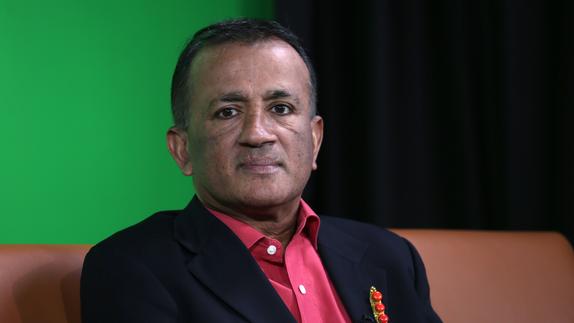 This July 17, 2020 photo shows Chandran Nair, founder and CEO of Global Institute For Tomorrow. (PARKER ZHENG / CHINA DAILY)
This July 17, 2020 photo shows Chandran Nair, founder and CEO of Global Institute For Tomorrow. (PARKER ZHENG / CHINA DAILY)
The Regional Comprehensive Economic Partnership heralds the birth of a post-Western world and is a clear marker that the international community wants to strengthen business ties with China instead of bowing to the unfair whims of the United States, Malaysian business leader Chandran Nair said.
Nair’s remarks came a week after the signing of the world’s biggest trade deal — the RCEP brings together countries that comprise 2.3 billion people and nearly 30 percent of global economic output.
The free trade agreement was signed by 15 Asia-Pacific economies including the 10-member Association of Southeast Asian Nations as well as China, Japan, South Korea, Australia and New Zealand.
The RCEP is testament to how the Asia-Pacific nations have opted for the path of multilateralism, irrespective of US protectionism, Malaysian business leader Chandran Nair said
The pact, centered on removing trade barriers, promised to eliminate up to 90 percent of tariffs among signatories in two decades.
ALSO READ: Finance chief: Hong Kong strives to join regional trade deal
Nair, the founder and CEO of the Global Institute for Tomorrow, a Hong Kong-based think tank, said the deal is testament to how the Asia-Pacific nations have opted for the path of multilateralism, irrespective of US protectionism.
“Despite all the political rhetoric (by the Western countries) that all countries fear the rise of China, actually many countries want China to be part of their trade pacts,” Nair said.
Nair added that in times of the COVID-19 pandemic, the RCEP could be the “rising tide that lifts all boats”, injecting business vitality to Asian economies to recover from the downswing.
“If it works well, then hundreds of millions of people could be lifted out of poverty,” he said.
The RCEP marks a major multilateral trade deal for China, which joined the pact because it sees a “net benefit” for all signatory countries, unlike the Trans-Pacific Partnership Agreement that heavily skewed toward the interest of the US, according to Nair.
Noting the “extremely varied” Southeast Asian economies in the RCEP, ranging from countries such as Singapore, with a GDP close to US$372 billion in 2019, to less developed economies such as Laos, whose GDP was worth US$18.17 billion in 2019, Nair said the agreement offers a window of opportunity for China to send a signal to its detractors and demonstrate its willingness to be a fair and responsible trading partner with other counties, big or small, while accommodating the constraint of smaller powers.
Nair believed that because of the large market size of China and the trajectory of its growth, the country will be the “dominant partner” in almost any pact, even those that include the US.
READ MORE: Partnership to lift regional cooperation
As an agreement that is not dominated by Western nations, the RCEP is a clear example that there are other important, more diversified alignments that a new world needs, which is not always subject to the US and its whims, Nair said.
“I think the world has got tired of the ‘America First’ mantra,” Nair said. “The unfortunate nature of United States politics at the moment is the presumption of exceptionalism, that the US must write the rules, it must dictate, and it must have a front-row seat.” Nair said he expected to see more countries trying to get out of the clutches of the US and having increasingly less tolerance for it to bully other countries. If the US ever imposed sanctions on a RCEP signatory country, then it would only speed decoupling from the US dollar as the reserve currency of the world, he said.
Hong Kong’s Financial Secretary Paul Chan Mo-po said on Sunday that Hong Kong hopes to be part of the first group of economies to join the RCEP after the agreement takes effect, which would hugely benefit the trade in services and investment — with both being advantages of Asia’s financial hub.
Chan said Hong Kong strives for deep integration with the nation’s dual circulation economy. While the Guangdong-Hong Kong-Macao Greater Bay Area can be a gateway for local businessmen to make inroads into domestic markets, such as professional services and high-value-added services, Hong Kong can also leverage its advantages in finance and innovation, especially the internationalization of the renminbi, he added.


